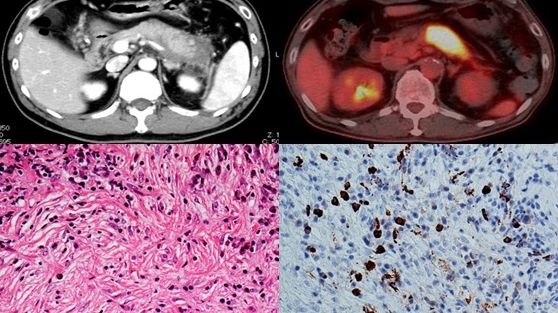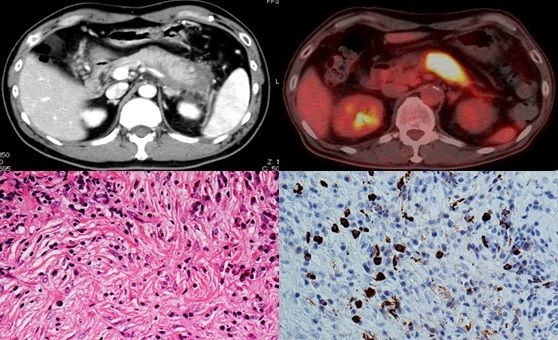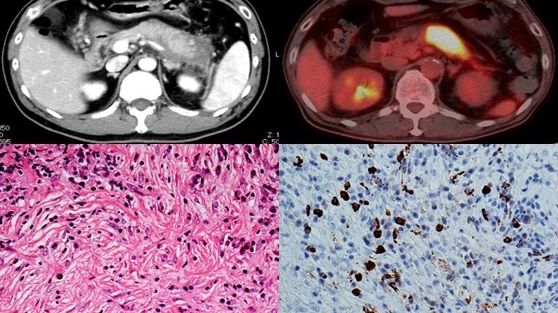
Press release -
World’s first! Identified pathogenic bacteria for autoimmune pancreatitis: A healthy intestinal environment may help prevent and treat autoimmune pancreatitis -- Kindai University
The research team led by Tomohiro Watanabe (Associate Professor at Department of Gastroenterology and Hepatology, Kindai University Faculty of Medicine, Osakasayama-city, Osaka) and Tomoe Yoshikawa (4th year of doctoral program at Department of Gastroenterology and Hepatology, Kindai University Faculty of Medicine, Osakasayama-city, Osaka) investigated the immunopathogenesis of autoimmune pancreatitis, an intractable disease, and revealed that impaired intestinal barrier, which protects the intestinal tract from pathogens and toxins, is involved in the disease development. Furthermore, they have identified for the first time in the world that the pathogenic bacterium for autoimmune pancreatitis is the intestinal bacterium Staphylococcus sciuri.
This research was published online in the “International Immunology” on Thursday, September 1, 2022 (10:00 am, Japan time). “International Immunology” is an international journal of the Japanese Society for Immunology.

(Upper right) PET-CT image of autoimmune pancreatitis,
(Lower left) Histopathological image of autoimmune pancreatitis (HE staining),
(Lower right) Histopathological image of autoimmune pancreatitis (IgG4 staining)
1. Key points
- Discovered that intestinal barrier dysfunction exacerbates autoimmune pancreatitis
- The pathogenic bacterium of autoimmune pancreatitis, an intractable disease, was identified as an intestinal bacterium, Staphylococcus sciuri
- Suggested that maintenance of a healthy intestinal environment may lead to the prevention and treatment of autoimmune pancreatitis
2. Background
Most cases of autoimmune pancreatitis (AIP) are pancreatic manifestations of systemic autoimmune disorder called IgG4-related disease (IgG4-RD). IgG4-RD is a new disease concept in which IgG4, one of the IgG subclass antibodies, increases in the blood and in damaged organs, and develops not only in the pancreas but also in multiple organs such as salivary glands, lungs, and kidneys. In recent years, as physicians' awareness of IgG4-RD has increased, the number of patients with IgG4-RD has also increased, and the number of patients today is estimated to exceed 10,000.
However, the molecular mechanisms underlying IgG4-RD have been poorly understood, and both IgG4-RD and AIP are registered as intractable diseases. Immunosuppressive therapy with steroids is commonly used for AIP; however, as steroids have various side effects, elucidation of the pathophysiology and development of new treatment are anticipated.
Since 2008, the research team has continued to investigate the immunopathogenesis of IgG4-RD and AIP and to search for therapeutic targets. The team discovered that the development of AIP is associated with excessive immune responses to intestinal bacteria in 2019, and they found that "type I interferon (IFN-α)" and "interleukin 33 (IL-33)" produced by plasmacytoid dendritic cells (pDCs) are useful biomarkers for AIP and IgG4-RD in 2020.
AIP and IgG4-RD are extremely common among the elderly people. It is known that in the elderly, when intestinal barrier is broken, and bacteria that normally colonize only in the intestinal tract translocate to other organs, causing immune disorders and lifestyle diseases. However, until now, the causal connection between the intestinal barrier and AIP/IgG4-RD remained elusive. It was also unclear what type of bacteria translocate to the pancreas and if that cause autoimmune pancreatitis when the intestinal barrier is disrupted.
3. Overview
Based on the fact that AIP is common among elderly men bearing impaired intestinal barrier function, the research team induced AIP in mice with intestinal barrier dysfunction to examine the relationship between intestinal barrier and AIP. As a result, it was clarified that a dysfunction of the intestinal barrier causes translocation of Staphylococcus sciuri into the pancreas and severe AIP. The team was the first in the world to identify Staphylococcus sciuri the pathogenic bacterium of AIP.
This can be considered to be an epoch-making research result that will lead to elucidation of the pathophysiology of AIP, prevention by maintaining a healthy intestinal environment, and development of new treatment methods.
Journal name:
International Immunology (Impact factor: 5.071)
Research paper title:
Disruption of the Intestinal Barrier Exacerbates Experimental Autoimmune Pancreatitis by Promoting the Translocation of Staphylococcus sciuri into the Pancreas
Authors:
Tomoe Yoshikawa1, Kosuke Minaga1, Akane Hara1, Ikue Sekai1, Masayuki Kurimoto1, Yasuhiro Masuta1, Yasuo Otsuka1, Ryutaro Takada1, Ken Kamata1, Masatoshi Kudo1, Tomohiro Watanabe1*, Shiki Takamura2, Ah-Mee Park3
*Corresponding author
Affiliation:
1 Department of Gastroenterology and Hepatology, Kindai University Faculty of Medicine
2 Department of Immunology, Kindai University Faculty of Medicine
3 Department of Microbiology, Kindai University Faculty of Medicine
URL:
https://academic.oup.com/intimm/article-lookup/doi/10.1093/intimm/dxac039

